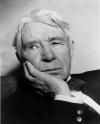RUM tiddy um,
tiddy um,
tiddy um tum tum.
My knees are loose-like, my feet want to sling their selves.
I feel like tickling you under the chinhoneyand a-asking: Why Does a Chicken Cross the Road?
When the hens are a-laying eggs, and the roosters pluck-pluck-put-akut and youhoneyput new potatoes and gravy on the table, and there aint too much rain or too little:
Say, why do I feel so gabby?
Why do I want to holler all over the place?. . .
Do you remember I held empty hands to you
and I said all is yours
the handfuls of nothing?. . .
I ask you for white blossoms.
I bring a concertina after sunset under the apple trees.
I bring out The Spanish Cavalier and In the Gloaming, O My Darling.
The orchard here is near and home-like.
The oats in the valley run a mile.
Between are the green and marching potato vines.
The lightning bugs go criss-cross carrying a zigzag of fire: the potato bugs are asleep under their stiff and yellow-striped wings: here romance stutters to the western stars, Excuse
me
. . .
Old foundations of rotten wood.
An old barn done-for and out of the wormholes ten-legged roaches shook up and scared by sunlight.
So a pickax digs a long tooth with a short memory.
Fire can not eat this rubbish till it has lain in the sun.. . .
The story lags.
The story has no connections.
The story is nothing but a lot of banjo plinka planka plunks.
The roan horse is young and will learn: the roan horse buckles into harness and feels the foam on the collar at the end of a haul: the roan horse points four legs to the sky and rolls in the red clover: the roan horse has a rusty jag of hair between the ears hanging to a white star between the eyes.. . .
In Burlington long ago
And later again in Ashtabula
I said to myself:
I wonder how far Ophelia went with Hamlet.
What else was there Shakespeare never told?
There must have been something.
If I go bugs I want to do it like Ophelia.
There was class to the way she went out of her head.. . .
Does a famous poet eat watermelon?
Excuse me, ask me something easy.
I have seen farmhands with their faces in fried catfish on a Monday morning.
And the Japanese, two-legged like us,
The Japanese bring slices of watermelon into pictures.
The black seeds make oval polka dots on the pink meat.
Why do I always think of niggers and buck-and-wing dancing whenever I see watermelon?
Summer mornings on the docks I walk among bushel peach baskets piled ten feet high.
Summer mornings I smell new wood and the river wind along with peaches.
I listen to the steamboat whistle hong-honging, hong-honging across the town.
And once I saw a teameo straddling a street with a hayrack load of melons.. . .
Niggers play banjos because they want to.
The explanation is easy.
It is the same as why people pay fifty cents for tickets to a policemens masquerade ball or a grocers-and-butchers picnic with a fat mans foot race.
It is the same as why boys buy a nickels worth of peanuts and eat them and then buy another nickels worth.
Newsboys shooting craps in a back alley have a fugitive understanding of the scientific principle involved.
The jockey in a yellow satin shirt and scarlet boots, riding a sorrel pony at the county fair, has a grasp of the theory.
It is the same as why boys go running lickety-split
away from a school-room geography lesson
in April when the crawfishes come out
and the young frogs are calling
and the pussywillows and the cat-tails
know something about geography themselves.. . .
I ask you for white blossoms.
I offer you memories and people.
I offer you a fire zigzag over the green and marching vines.
I bring a concertina after supper under the home-like apple trees.
I make up songs about things to look at:
potato blossoms in summer night mist filling the garden with white spots;
a cavalrymans yellow silk handkerchief stuck in a flannel pocket over the left side of the shirt, over the ventricles of blood, over the pumps of the heart.
Bring a concertina after sunset under the apple trees.
Let romance stutter to the western stars, Excuse
me
Potato Blossom Songs and Jigs
written byCarl Sandburg
© Carl Sandburg








